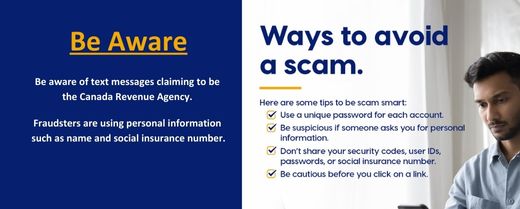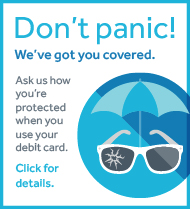
Fraud Prevention

Chances are, most of us have received that unsolicited text, email or a website link asking for information. Sometimes it's hard to know the difference between what's legitimate and what isn't. While fraud comes in many forms, the good news is that being aware can help you stay safe.
According to the Canada Revenue Agency (CRA) website, the CRA will not ask you by text message or email for personal information, bank information or payments. Please see the link below to the latest scams as reported by the CRA.
If you are contacted by someone claiming to be from an organization known to you, always independently verify the source. Hang up or delete the message and call the published phone number of the organization in question to verify the source of the communication. Do not use contact information that they have provided to you.
User awareness becomes KEY....check out what the Competition Bureau is doing in their effort to combat fraud.
Here are some tips:
Don't be fooled by the promise of a valuable prize in return for a low-cost purchase.
Don’t be intimidated by high-pressure tactics.
Be extra cautious about texts, calls, emails or mailings offering international bonds or lottery tickets, a portion of a foreign dignitary's bank account, free vacations, credit repair or schemes with unlimited income potential.
Don't be afraid to hang up the phone, delete a text, delete an email or close your internet connection.
Don't purchase a product or service without carefully checking out the product, service and company.
Don't be afraid to request further documentation from the caller so you can verify the validity of the company. At the same time, verify information independently. Don’t rely on the information you are provided.
Never disclose personal information about your finances, bank accounts, credit cards, social insurance and driver's license numbers to any business that can't prove it is legitimate.
Shred unwanted personal information such as bank statements, credit card bills, unwanted receipts, cheques, pre-approved credit applications and old tax returns.
Check your credit report every year and report problems immediately.
If a scam artist contacts you, or if you've been defrauded: Report it! Your reports are vital to the anti-fraud efforts of law enforcement agencies.
Additional fraud resources to keep you safe throughout the year:
Websites:
The Canadian Anti-Fraud Centre
Royal Canadian Mounted Police
Competition Bureau
CRA scam alerts - Canada.ca

